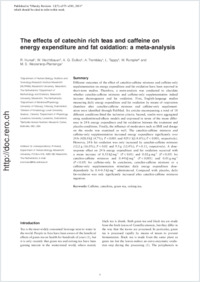The effects of catechin rich teas and caffeine on energy expenditure and fat oxidation: a meta-analysis
- Hursel, R. Department of Human Biology, Nutrition and Toxicology Research Institute Maastricht (NUTRIM), Maastricht University, The Netherlands
- Viechtbauer, W. Department of Methodology and Statistics, Maastricht University, The Netherlands
- Dulloo, Abdul G. Department of Medicine/Physiology, University of Fribourg, Switzerland
- Tremblay, A. Division of Kinesiology, Laval University, Quebec, Canada
- Tappy, L. Department of Physiology, Lausanne University, Switzerland
- Rumpler, W. Beltsville Human Nutrition Research Center, Beltsville, MD, USA
- Westerterp-Plantenga, M. S. Department of Human Biology, Nutrition and Toxicology Research Institute Maastricht (NUTRIM), Maastricht University, The Netherlands
-
02.03.2011
Published in:
- Obesity Reviews. - 2011, vol. 12, no. 7, p. e573–e581
English
Different outcomes of the effect of catechin-caffeine mixtures and caffeine-only supplementation on energy expenditure and fat oxidation have been reported in short-term studies. Therefore, a meta-analysis was conducted to elucidate whether catechin-caffeine mixtures and caffeine-only supplementation indeed increase thermogenesis and fat oxidation. First, English-language studies measuring daily energy expenditure and fat oxidation by means of respiration chambers after catechin-caffeine mixtures and caffeine-only supplementation were identified through PubMed. Six articles encompassing a total of 18 different conditions fitted the inclusion criteria. Second, results were aggregated using random/mixed-effects models and expressed in terms of the mean difference in 24 h energy expenditure and fat oxidation between the treatment and placebo conditions. Finally, the influence of moderators such as BMI and dosage on the results was examined as well. The catechin-caffeine mixtures and caffeine-only supplementation increased energy expenditure significantly over 24 h (428.0 kJ (4.7%); P < 0.001 and 429.1 kJ (4.8%); P < 0.001, respectively). However, 24 h fat oxidation was only increased by catechin-caffeine mixtures (12.2 g (16.0%); P < 0.02 and 9.5 g (12.4%); P = 0.11, respectively). A dose-response effect on 24 h energy expenditure and fat oxidation occurred with a mean increase of 0.53 kJ mg⁻¹ (P < 0.01) and 0.02 g mg⁻¹ (P < 0.05) for catechin-caffeine mixtures and 0.44 kJ mg⁻¹ (P < 0.001) and 0.01 g mg⁻¹ (P < 0.05) for caffeine-only. In conclusion, catechin-caffeine mixtures or a caffeine-only supplementation stimulates daily energy expenditure dose-dependently by 0.4–0.5 kJ mg⁻¹ administered. Compared with placebo, daily fat-oxidation was only significantly increased after catechin-caffeine mixtures ingestion.
- Faculty
- Faculté des sciences et de médecine
- Department
- Département de Médecine
- Language
-
- English
- Classification
- Dietetics, nutrition
- License
-
License undefined
- Identifiers
-
- RERO DOC 27135
- DOI 10.1111/j.1467-789X.2011.00862.x
- Persistent URL
- https://folia.unifr.ch/unifr/documents/302074
Statistics
Document views: 119
File downloads:
- pdf: 1456
